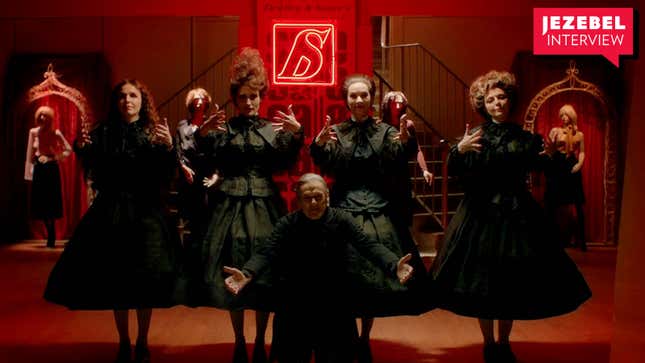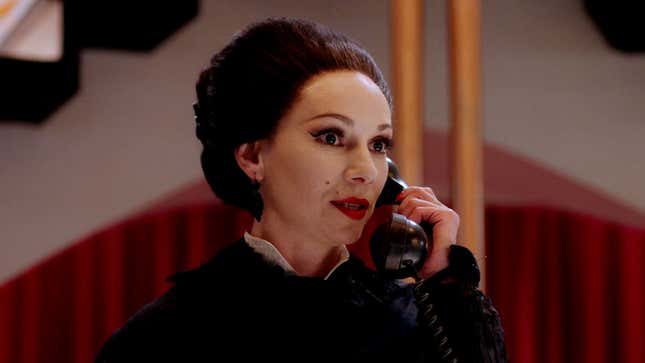Peter Strickland on His Retail Nightmare In Fabric and Impossible Filmmaking
In an interview, the writer-director talks about his aesthetic influences and as-yet-unmade gay movie Night Voltage
Entertainment
Image: A24
Retail therapy has never been such a horrifying proposition than it is in British filmmaker Peter Strickland’s fourth feature In Fabric. It concerns an enchanted, “artery red” dress that curses all who wear it. Set in 1993, it’s both earnest and off-the-wall, a story about the mundanity of middle age (Marianne Jean-Baptiste plays Sheila, the film’s sincere emotional center who puts up with a host of casual injustices while working at a bank and looking for love via personal ads) and the cultlike operations of the fictional Dentley & Soper’s department store. Strickland regular Fatma Mohamed, in particular, delivers a raving mad performance as Miss Luckmoore, who after hours removes her giant wig to reveal a Mr. Clean-bald head, performs sex rituals with mannequins, and disappears into the dumbwaiter shafts. During business hours, she says deliciously stilted things to customers like, “The hesitation of your voice soon to be an echo in the recesses of the sphere of retail,” and, “In apprehensions lie the crevices of clarity.”
It’s the latest wild ride from the mind of Strickland, whose last film, 2014’s The Duke of Burgundy, explored bottoming from the top and other power dynamics in a BDSM relationship. When I interviewed Strickland about that movie upon its U.S. release, we discussed the notion that a movie depicting a romance between two women is more user-friendly than that of one between two men. “What will be really interesting is with this other film [about a male/male relationship], how quickly I can get the money for that. That will determine whether that’s true or not,” he told me. Now almost five years later, he’s yet to secure money for that movie, a period piece about gay men and hi-NRG music set in 1980 New York, in the period of sexual liberation that immediately preceded public awareness of AIDS.
Strickland discussed the difficulties of getting that project off the ground, his general obstacles for executing his artistic vision in film, and In Fabric’s rather affectionate satire of consumerism with Jezebel. A condensed and edited transcript of our discussion is below.
JEZEBEL: In terms of your aesthetic inspiration here, a lot of reviews have mentioned gialli, but I didn’t see that at all.
PETER STRICKLAND: I didn’t see that, no.
Did you have specific aesthetic influences you were playing with?
Department stores, real life-department stores that I grew up with, which were very strange places. Not like Macy’s: small, family-run places. Very mysterious, very flamboyant. They had this weird mixture of Edwardian Victorian Britain but also ’50s, ’60s, ’70s, and never [progressed] beyond the ’70s. That was the number one thing. There were a few influences here and there, but not many…
No movies outright, though?
-

-

-

-

-

-

-

-

-

-

-

-

-

-

-

-

-

-

-

-

-

-

-

-

-

-

-

-

-

-

-

-

-

-

-

-

-

-

-

-









































